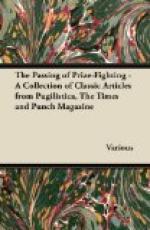The life that is flagrantly double,
Conflicting in conduct and
aim,
Is seldom untainted by trouble
And commonly closes in shame;
But no such anxieties pester
Your dual existence, which
links
The functions of don and of jester—
High
thought and high jinks.
Your earliest venture perhaps is
Unique in the rapture intense
Displayed in these riotous Lapses
From all that could savour
of sense,
Recalling the “goaks” and
the gladness
Of one whom we elders adored—
The methodical midsummer madness
Of
ARTEMUS WARD.
With you, O enchanting Canadian,
We laughed till you gave us
a stitch
In our sides at the wondrous Arcadian
Exploits of the indolent rich;
We loved your satirical sniping,
And followed, far over “the
pond,”
The lure of your whimsical piping
Behind
the Beyond.
In place of the squalor that stretches
Unchanged o’er the realist’s
page,
The sunshine that glows in your Sketches
Is potent our griefs to assuage;
And when, on your mettlesome charger,
Full tilt against reason you
go,
Your Lunacy’s finer and Larger
Than
any I know.
The faults of ephemeral fiction,
Exotic, erotic or smart,
The vice of delirious diction,
The latest excesses of Art—
You flay in felicitous fashion,
With dexterous choice of your
tools,
A scourge for unsavoury passion,
A
hammer for fools.
And yet, though so freakish and dashing,
You are not the slave of your
fun,
For there’s nobody better at lashing
The crimes and the cant of
the Hun;
Anyhow, I’d be proud as a peacock
To have it inscribed on my
tomb:
“He followed the footsteps of LEACOCK
In
banishing gloom.”
* * * * *
From an Indian clerk’s letter to his employer:—
“I am glad that the
War is progressing very favourably for the
Allies. We long for the
day when, according to Lord Curzon’s
saying, ‘The Bengal
Lancers will petrol the streets of Berlin.’”
Quite the right spirit.
* * * * *
[Illustration: Awe-struck Tommy (from the trenches). “LOOK, BILL—SOLDIERS!”]
* * * * *
OUR BOOKING-OFFICE.
(By Mr. Punch’s Staff of Learned Clerks.)
It may be as well for me to confess at once the humiliating fact that I am not, and never have been, an Etonian. If that be a serious disqualification for life in general, how much more serious must it be for the particular task of reviewing a book which is of Eton all compact, a book, for example, like Memories of Eton Sixty Years Ago, by A.C. AINGER, with contributions from N.G. LYTTELTON and JOHN




